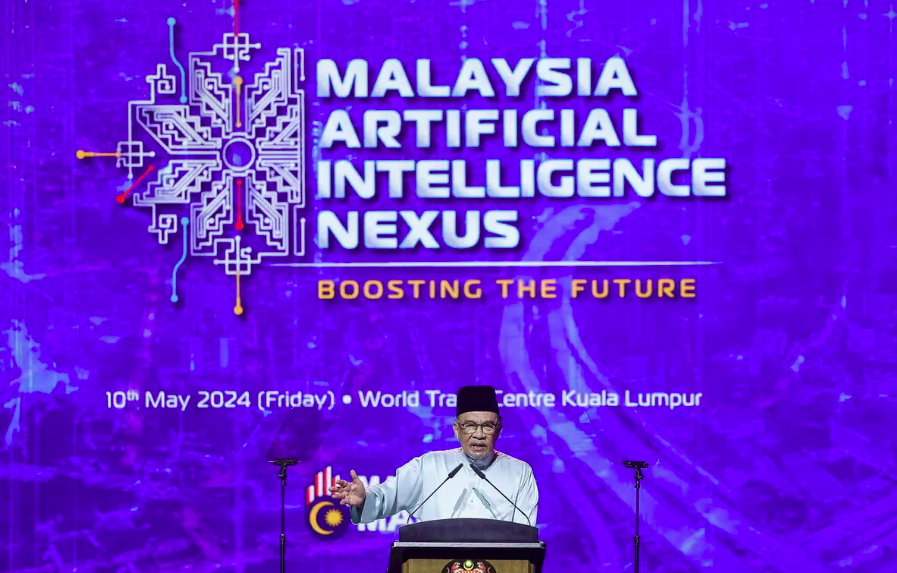Prime Minister Datuk Seri Anwar Ibrahim: “I have consulted with representatives from Nvidia, Google, Microsoft, Amazon, Huawei, and Ericsson. They have acknowledged that our fresh engineering and science graduates are disciplined. However, there is a noticeable deficit in the skills, abilities, and specializations required.”
KUALA LUMPUR (May 10): Malaysia needs to accelerate its efforts to establish a robust ecosystem to drive the development and adoption of artificial intelligence (AI) technology in this evolving post-normal era, stated Prime Minister Datuk Seri Anwar Ibrahim.
He noted that after leading the government for a year and a half, it became evident that the country’s challenge lies in the lack of determination to explore innovative thinking and to act swiftly.
“We cannot adhere to outdated methodologies. If we need more engineers, an immediate approach must be taken to acquire them because this post-normal era demands rapid and decisive action,” he remarked while inaugurating the 2024 Malaysia Artificial Intelligence Nexus (MY AI NEXUS) program here on Friday.
Anwar delineated the four pillars of the ecosystem: AI governance to ensure a systematic innovation ecosystem; AI catalyst through the Malaysia Artificial Intelligence Consortium (MAIC) to facilitate coordination in education, development, and application; AI industry fostering collaboration with multinational corporations; and AI talent encompassing professionals and skilled individuals through educational and training programs as well as industry-academia partnerships.
Also in attendance were Higher Education Minister Datuk Seri Dr. Zambry Abdul Kadir, Communications Minister Fahmi Fadzil, Digital Minister Gobind Singh Deo, and Science, Technology, and Innovation Minister Chang Lih Kang.
During the event, Anwar also inaugurated the AI Faculty at Universiti Teknologi Malaysia (UTM) and lauded the university’s success in establishing the faculty within just four months at the government’s behest.
“This demonstrates our capacity for change. If universities, as the vanguards of national and public thought, are not prepared to embrace enlightenment, pursue new intellectual frontiers, and exhibit this capability, we will be left behind,” he asserted.
The prime minister emphasized the necessity of producing more skilled engineers, noting that Malaysia currently faces a shortfall of approximately 30,000 engineers to meet industry demands.
Consequently, Anwar urged the Ministry of Higher Education, universities, and training institutions to engage with industry representatives to enhance training quality to produce highly skilled engineers.
“I have sought input from Nvidia, Google, Microsoft, Amazon, Huawei, and Ericsson representatives. They commended the discipline of our new engineers and science graduates but highlighted a gap in necessary skills, abilities, and specialization,” he observed.
The prime minister underscored that universities and training institutions must focus on the quality of engineers produced, not just the quantity, as investment in the country will be impacted if the industry perceives a lack of requisite skills.
Anwar also highlighted the need to rekindle young people’s interest, especially students, in science, technology, engineering, and mathematics (STEM) subjects, which are currently waning.
“Without this, the ecosystem cannot be built. We can discuss and launch AI today, but if the groundwork from grassroots to advanced levels is missing, it won’t be sustainable,” he stated.
To address this, Anwar suggested that all levels of the Ministry of Education and schools should devise methods to make STEM subjects engaging and not mundane, potentially utilizing AI technology in teaching to captivate students’ interest.
This article was originally published on theedgemalaysia. Read the orignal article.
FAQs
- Why is AI development crucial for Malaysia? AI development is vital for Malaysia to stay competitive in the global economy, create high-value jobs, and drive innovation across various sectors.
- What are the key pillars of Malaysia’s AI ecosystem? The key pillars are AI governance, AI catalyst, AI industry collaboration, and AI talent development.
- How can universities contribute to AI development? Universities can contribute by providing specialized training, conducting cutting-edge research, and fostering industry partnerships.
- What role does the private sector play in AI development? The private sector is essential for investing in R&D, fostering innovation, and collaborating with academic and government institutions.
- What are the future prospects for AI in Malaysia? With the right strategies, AI can significantly enhance Malaysia’s economy, create jobs, and improve the overall quality of life.
